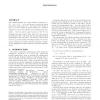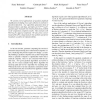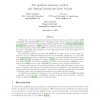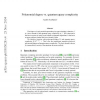62 search results - page 1 / 13 » Quantum lower bound for the collision problem |
STOC
2002
ACM
14 years 5 months ago
2002
ACM
The collision problem is to decide whether a function X : {1, . . . , n} {1, . . . , n} is one-to-one or two-to-one, given that one of these is the case. We show a lower bound of...
CORR
2011
Springer
12 years 12 months ago
2011
Springer
We show that any quantum algorithm to decide whether a function f : [n] → [n] is a permutation or far from a permutation must make Ω n1/3 /w queries to f, even if the algorith...
COCO
2001
Springer
13 years 9 months ago
2001
Springer
We present several applications of quantum amplitude amplification to finding claws and collisions in ordered or unordered functions. Our algorithms generalize those of Brassard...
COCO
2005
Springer
13 years 10 months ago
2005
Springer
We introduce two new complexity measures for Boolean functions, which we name sumPI and maxPI. The quantity sumPI has been emerging through a line of research on quantum query com...
FOCS
2003
IEEE
13 years 10 months ago
2003
IEEE
The degree of a polynomial representing (or approximating) a function f is a lower bound for the quantum query complexity of f. This observation has been a source of many lower bo...




